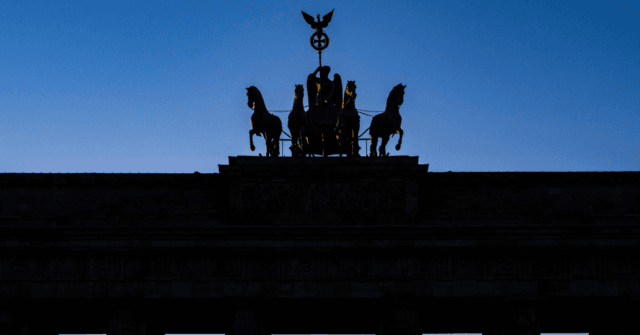
Energy costs are set to soar throughout Europe and the UK once again following Germany obstructing the approval of Russia’s Nord Stream 2 pipeline amidst the ongoing strife in Ukraine.
Europe’s natural gas cost benchmark– which is determined by the rate per unit of energy traded in the futures market in the Netherlands– saw a spike of 13 per cent on Tuesday. Even after coming down a little on the day by the end of trading levelling out around 10 per cent greater, the marketplace price is still 14 per cent greater than just 5 days back.
Despite Russian gas just representing 3 per cent of Britain’s gas usage, the UK, for its part, saw its own standard jump by 10 percent on Tuesday, the i newspaper reported.
While the circulation of gas has not changed from Russia into Europe as of yet, the futures traders were likely operating under the assumption that Russian leader Vladimir Putin would attempt to punish Europe after the choice by German Chancellor Olaf Scholz to prevent the controversial Nord Stream 2 pipeline from finding regulatory approval.
Playing into such issues, former Russian President Dmitry Medvedev said in action to the pipeline cancellation on Tuesday: “Invite to the brave new world where Europeans are soon going to pay EUR2,000 for 1,000 cubic meters of gas!”
Presently, Germany receives around half of its natural gas from Russia. Chancellor Scholz has promised to search for alternative sources of energy to end up being less dependent on Russia, yet, it stays to be seen if his union government– which is made up partially of an alliance with the Green Party– will reverse the government’s choice to close down its atomic energy sector, or indeed raise the prohibition on fracking in Germany.
German Chancellor Sholz Blocks Approval for Russia’s Nord Stream 2 Pipeline over Putin’s Relocations in Ukrainehttps://t.co/T8azzZThPQ
— Breitbart London (@BreitbartLondon) February 22, 2022
On Wednesday, Federal Minister of Economics Robert Habeck said that the government will aim to at least temporarily suspend the Renewable Energy Act (EEG) surcharge tax on energy that is directed towards supposedly green energy sources such as wind and solar.
“We can barely intervene worldwide market value, for gas or oil. Nevertheless, we will abolish the EEG additional charge,” the Green politician stated.
Habeck went on to state that current stockpiles of gas in Germany will have the ability to sustain the nation throughout the current crisis and said that eventually Germany will have the ability to completely move away from Russian gas.
Ought to Germany in fact follow through and choose to buy liquified gas from the world market instead of directly from Russia, rates would likely increase dramatically around the world, as demand increases on limited supply.
Germany ‘Significantly Behind’ its Emissions Target After Abandoning ‘Dangerous’ Atomic Energyhttps://t.co/9C9al17fGT
— Breitbart London (@BreitbartLondon) January 14, 2022
As has been the case with the UK, the disagreement over Ukraine is most likely to influence prices beyond Europe, such as in the United States of America as international need jumps. Admitting to this truth, throughout a White House speech on Tuesday night President Joe Biden stated: “Defending flexibility will have costs, for us too, and here in your home … We need to be honest about that.”
“I wish to restrict the discomfort the American individuals are feeling at the gas pump,” Biden continued.
Ukraine is among many factors impacting changes in gas prices– amongst them Coronavirus disturbances, strong need in the east, increasing need in Europe as lockdowns end, and facilities and storage failures affecting reserve holdings.
Unlike Germany, Prime Minister Boris Johnson has so far refused to captivate tax cuts on energy, with quotes projecting that the average some 25 percent of energy costs are directed towards green energy tasks. The federal government has actually likewise refused to cut the Value Added Tax (VAT) on energy, in spite of Johnson formerly arguing that such an idea would be a benefit of leaving the European Union.
A senior financial investment and markets analyst at British financial service firm Hargreaves Lansdown, Susannah Streeter told the Daily Mail: “Currently oil and gas costs are marching upwards as Russia put boots on the ground in Eastern Ukraine, and as fears of an escalation of the circumstance mount, it’s caused expectations of even higher rates to come.”
She went on to alert that need to a full-scale conflict break out, there might be additional increases in food inflation as grain deliveries from Ukraine, Russia, Romania, and Kazakhstan in the Black Sea could be interfered with.
“The additional pounds on expenses are piling up for hard-hit families, with the boost in fuel, energy and grocery bills set to hit lower-income homes harder as a greater percentage of their outgoings will be invested in travel expenses. With spending plans being squeezed even more the likely ripple effect will be a hit to customer self-confidence after any lockdown savings are deteriorated.”
Build Back Much Better: From Boris Johnson to Greta and Termination Rebellion, Britain’s Year of Climate Craziness https://t.co/L4Vn4BAqMi
— Breitbart London (@BreitbartLondon) December 31, 2021
Follow Kurt Zindulka on Twitter here @KurtZindulka

